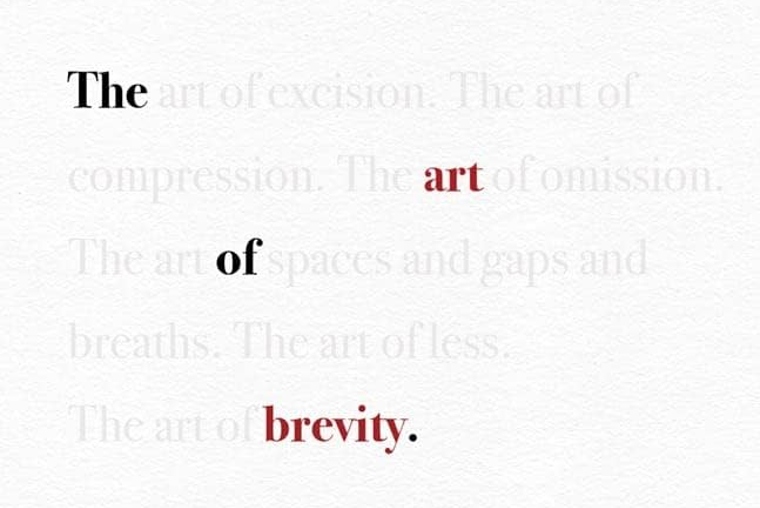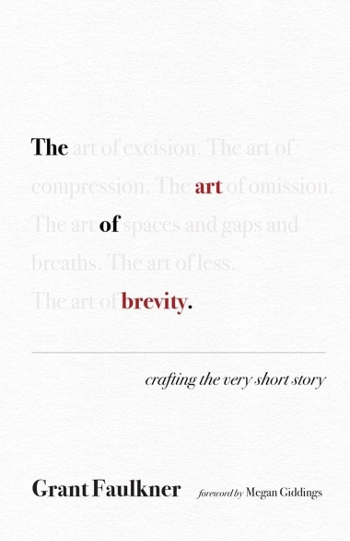

Readers may know Grant Faulkner for his work as director of National Novel Writing Month (NaNoWriMo) — a nonprofit organization dedicated to encouraging aspiring writers to pen a whole novel in 30 days — but his newest book, The Art of Brevity: Crafting the Very Short Story, focuses on a different kind of literary challenge: flash fiction.
This book came to be after years of Faulkner tinkering with the form, which encompasses stories 1,500 words or less. He described the process of coming to the “short-short story” as a surprise process in the book.
The book itself is a surprise. It is a hybrid of craft book and memoir of craft, including short meditations on different aspects of flash fiction including context, collar, poetics, white space, omission, the sentence, challenges and endings.
In each section, Faulkner explores his relationship with the topic, how he came to understand its usage in flash fiction and ways that it has been used by others.
The prompts relate to the topic of the section they follow, and serve the useful double purpose of allowing the reader to gain low-pressure experience “alongside” an instructor while recommending relevant works by other accomplished short writers. It is a craft book, yes, but it is also a love letter to a form that awakened a new brand of creativity in an author who was established in the near opposite.
On traditional short form fiction and workshopping in general, Faulkner poses in The Art of Brevity: “Even when I got my MFA … I frequently heard the comment, ‘I want to know more about [blank]’ … None of us stopped to ask if this ‘more’ added to the story or if it was just a passing curiosity of the reader’s, a need to have the story spelled out instead of imagined.”
With this background, Faulkner was surprised to find so much joy in the super-short form. In the book he discusses his own biases for certain aesthetics and the hurdles with which he struggled (and delighted in) as he himself was wrestling with his self-imposed 100-word limit. “All of this created creative fuel so I could return to my novels.”
The Art of Brevity strives to make itself easily readable to those who pick it up. Each section is no more than five pages and, in the introduction, Faulkner encourages his readers to take their time with the book and even skip around as different ideas strike them. This book, much like the form to which it is dedicated, does not demand time from its reader. It is available as a tool and an intellectual pursuit, but it is in no way a chore or an obligation. Also like flash fiction, when it’s good, the ideas here stay with the reader.
If one aims to find a world in vignettes and fragments, this volume will certainly help along the path. The philosophy and prompts (and in some tour locations, classes) lend The Art of Brevity nicely to a craft discussion or a study for the independent writer.
Mini-Profile: Grant Faulkner
When Grant Faulkner first started writing flash fiction, he was struggling with a novel he’d been working on for a decade.
“It’s an addictive form,” the Oskaloosa-raised writer told Little Village in a Zoom interview. “It gave me a break from the novel, and writing these short little pieces gave me a sense of satisfaction which was really helpful.”
Flash fiction is a short form of fiction writing that’s no more than 1,500 at most and is more typically 1,000 words or less. A friend of his introduced Faulkner to a stricter guideline: exactly 100 words.
“I compare it to a Rubik’s Cube,” Faulkner said. “You have 97 words, so you can add three. But then you have 105 words. The story continues to morph and change and you might discover new things about the story as you try to cut it down. One hundred is not a magic number. It’s the process of getting it down to 100 words.”
It requires a close attention to what has been added to the story, and more importantly, “paying attention to what you leave out.”
After seeing a friend write an entire memoir in 100-word vignettes he saw, “all of those moments added up to a life. Memoirs are about war, addiction, family dysfunction, and in this memoir he was able to get really into the nooks and crannies of life in these really short pieces.”
In The Art of Brevity, Faulkner says, “Some think such fragmentary brevity makes this Twitter and Facebook era perfect for flash fiction because its shortness fits snugly into the flitting attention spans of internet readers … but a well-crafted short-short demands not to be read quickly but to be read multiple times, with the attention one brings to a poem.”
After working within this form and studying it for many years, Faulkner believes that the most powerful pieces are the ones that require humility from the writer and some labor from the reader.
Within The Art of Brevity, Faulkner hopes to help readers find their way into this form of flash fiction. He structured the book as meditations on flash fiction to encourage readers to come to their own conclusions and each section ends with a set of prompts.
“Sometimes craft books can be prescriptive and I didn’t want that,” Faulkner said, “I don’t think of craft as rules. [I am] constantly thinking about language and how you can use it.”
This article was originally published in Little Village’s September 2023 issue.





